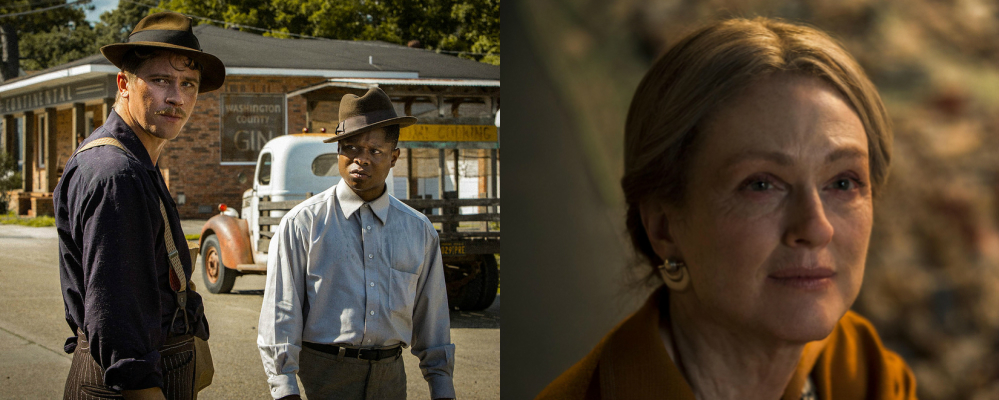Mudbound
 (3.5 / 5)
(3.5 / 5)
“Man that is born of a woman hath but a short time to live, and is full of sorrow.”
It’s misery and anguish that are the heart of Mudbound, Dee Rees’ Netflix-bound period drama about farmers in early 20th Century Mississippi.
Based on Hilary Jordan’s book of the same name, the film shows how slavery and injustice endured long past the point of abolition. Opening with two men, the McAllan brothers – the mean-eyed, matter-of-fact Henry (Jason Clarke) and jaunty drunkard Jamie (Garrett Hedlund) – trying to dig a grave amid a deluge. Struggling in the dirt, whether claggy or dry, to bury a relative or eke out a living, is, for these folks, the only way they can imagine making a living.
The forty acres and a mule given to the Jackson family’s forebears have long since been taken from them – or else died. Hap Jackson (Rob Morgan), reduced to being a sharecropper, tends fields that are not his own. The mule he’s forced to rent. His wife Florence (a resolutely unglamorous Mary J. Blige) is similarly compelled to care for the children of Henry and his wife Laura (Carey Mulligan). It’s presented as an opportunity for the Jacksons to earn more money, but done with cheery presumption and a terrible obliviousness at their inability to refuse.
It’s the same disregard that Jamie shows in striking up a kinship with the Jackson’s son, Ronsel (Jason Mitchell); like him freshly returned from the Second World War. The liberation of Europe, though shattering for Jamie, has liberated Ronsel, too; much to the chagrin of the hateful Pappy McAllan (a seething, teeth-sucking Jonathan Banks).
Dee Rees’ and Virgil William’s screenplay makes use of the novelistic structure, offering insights into the character’s souls through hard-bitten yet poetic voice-over – “I dream in brown”, says the formerly sheltered Laura; whose once-comfortable existence is now couched in pain and hardship. Mudbound can feel like an endurance test at times, not because of any particular horror or bloodshed, but because of its Falkneresque depiction of struggles and hardships and our empathy for them.
The most these people can hope from life is a brief respite or fleeting pleasure, a bath or a bar of chocolate. Maybe that’s enough.
Wonderstruck
 (1.5 / 5)
(1.5 / 5)
After the incredible subtlety and delicacy of Carol – my film of 20151 – you’d be forgiven for wondering exactly when, in the lead-up his work as director of Wonderstruck, Todd Haynes sustained a blow to the head.
Based on the illustrated novel by Brian Selznick – who also wrote the book on which Martin Scorsese’s Hugo was based – it’s certainly an intriguing project; at least in concept.
The film tells the parallel stories of Ben (Oakes Fegley), a long-haired eleven-year-old from Gunflint Lake, Minnesota, whose mother (a criminally underused Michelle Williams) has recently been killed in a car accident, and Rose (Millicent Symonds), a moon-faced girl of roughly the same age who lives in Hoboken, New Jersey, with her poker-faced father. Spurred on by circumstance, they both set out to New York: he in search of his father, unidentified except by a name on a bookmark; she dreaming of meeting silent film star Lilian Mayhew (Julianne Moore2). Coincidentally, both Rose and Ben are deaf; she apparently from birth, he from an unlikely incident involving a telephone receiver and a bolt of lightning.
Though separated by half a century – Ben arrives in Manhattan in 1977; Rose some fifty years earlier – Haynes establishes a sense of continuity while shooting each narrative in a style reflective of the era. For Ben’s story, this colour-negative film, which brings out the heat on those seedy New York streets with its 24-hour porno theatres and urban dereliction. For Rose, the film slips into sharp, expressive black-&-white, taking its cues from the likes of F.W. Murnau. It’s a shame, given the contrast, that one story essentially falls by the wayside come the third act.
Both on their voyage of discovery take a trip to the Natural History Museum when Rose finds herself face-to-face with a comically stern and upright security guard (played by House of Cards‘ Damian Young) and Ben makes a friend, Jamie (Jaden Michael), who leads him on adventure that’s Night at the Museum as shot by Michelangelo Antonio. Despite its attempt to conjure up a sense of childhood wonder – the first museums exhibits were, the film informs us, known as Cabinets of Wonder – it can’t help but feel overly precious, and hinged on coincidences. My housemate Alex has described Wonderstruck as a feature-length version of a John Lewis advert – not even one of the good ones – and, though perhaps uncharitable, he’s not entirely wrong in that regard.
It may justifiably be aimed at a younger audience, but, compared to the masterpiece of Carol, this is the cinematic equivalent of a Macaroni painting: fiddly and precious, less art or craft than arts & crafts. All glitter, no gold; all blue-lit wolves and no bite, Wonderstruck is simply away with the fairies.
